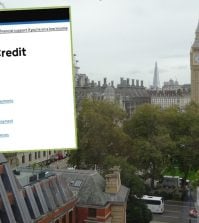New UK civil service chief to help implement mission-driven government as Simon Case announces departure

The UK government has set out the key responsibilities of the next cabinet secretary after Simon Case announced that he will step down from the role at the end of the year.
In an announcement to civil servants yesterday, Case said that he had informed the prime minister Sir Keir Starmer that he will step down at the end of the year. He has been undergoing medical treatment for a neurological condition over the last 18 months and it had been expected he would stand down by the end of 2024, which has now been confirmed.
As Case’s departure was announced, the job description for the next cabinet secretary and head of the civil service was published on the UK government jobs website.
The job description sets out that the cabinet secretary and head of the civil service is the most senior civil servant in the UK and the principal official adviser to the prime minister and Cabinet.
In particular, the new head of the civil service will help the prime minister deliver his mission-driven approach. The Labour government that was elected in July has pledged to focus on five national missions: kickstart economic growth; make Britain a clean energy superpower; reduce crime to “take back our streets”; break down barriers to opportunity; and build an NHS fit for the future.
According to the job description, the new cabinet secretary will “deliver the government’s mission-driven programme; pursue reforms that make government work better; create a more united democracy; and, strengthen and secure the United Kingdom at home and abroad”.
Read more: ‘Deliverology’ pioneer Sir Michael Barber returns to advise UK prime minister on national missions
As well as being the prime minister’s principal official adviser, the job summary sets out that the cabinet secretary is also the leader of the UK civil service. The new cabinet secretary will be responsible for “ensuring the effective implementation of the government’s priorities and delivery of public services through departments”, as well as “ensuring that departments have the necessary capability and leadership through the recruitment, performance management and development of permanent secretaries”.
The new leader will also be responsible for leading an “effective and politically impartial” civil service, ensuring that it is a “modern, professional and digitally enabled organisation that leads the way in world class administration of government and delivery of modern public services”.
The advert for the post comes at a time when the civil service is under scrutiny, with the Civil Service Commission reviewing a series of hires made by the new Labour government after concerns that rules were being bypassed to allow political appointments. There have also been a number of press reports about tensions in the prime minister’s Downing Street operations, with briefings against his chief of staff in particular, the former senior civil servant Sue Gray.
Read more: UK Civil Service Commission to review Labour Whitehall appointments
Job description sets out essential criteria for cabinet secretary
The salary for the post is expected to be around £200,000 per annum, in line with Case’s remuneration, which has been reported in government pay transparency data as £200,000-£204,999.
Unlike when Case was appointed, there is no mention in the job advert of applications being invited from “current and former permanent secretaries”. However, the person specification sets out eight essential criteria for the post:
- The ability to secure the confidence of the prime minister and the cabinet.
- Exceptional leadership skills with an ability to inspire a large and complex organisation, and in particular to command the confidence and respect of permanent secretaries of departments.
- A sharp intellect combined with an understanding of the geopolitical and security challenges faced by the UK.
- Exceptional communication skills and high personal impact, and the ability to command credibility with senior politicians and colleagues across Whitehall.
- Well-developed political sensitivity to secure the confidence of ministers and key stakeholders.
- A track record of working with others to deliver common goals and objectives.
- Strong commitment to the Civil Service values of impartiality, honesty, integrity and objectivity; and,
- Confident, inclusive and compassionate leadership skills, with a proven ability to enthuse and lead others through changes.
A “full, open and transparent process” will now be run, led by the first civil service commissioner Baroness Gisela Stuart. She will chair a panel of independent members who, following interviews, will advise the prime minister on appointable candidates for the role, and the prime minister will then appoint Case’s successor.
The closing date for applications for the role is 20 October, with shortlisted applicants taking part in a leadership assessment, followed by a panel interview in the week commencing 4 November. The panel will be chaired by Stuart, and will include Brian McBride (lead non-executive director MoD, and non-executive member of the civil service senior leadership committee), Lord Gus O’Donnell (former cabinet secretary) and Dame Sharon White (former second permanent secretary at the UK Treasury).
Read more: UK government offers training for new ministers
Case reflects on ‘far more ups than downs’
Announcing his decision to step down, Case said that his departure comes after 18 months of medical treatment, and that “whilst the spirit remains willing, the body is not”.
Amid the recent coverage of civil service transition to the new Labour government, he added that: “It is a shame that I feel I have to spell this out, but my decision is solely to do with my health and nothing to do with anything else.”
Case said that “it has been an honour to serve two sovereigns, four prime ministers and over 120 cabinet ministers in this role”, at a time of political turmoil in the UK around Brexit and then the COVID-19 pandemic.
“There have been far more ups than downs along the way and by far the greatest highlight has been the privilege of working with so many remarkable public servants, across the length and breadth of our country, in our overseas posts and with counterparts from our close allies and partners around the world,” said Case.
He said that the civil service will need to “continue the pursuit of that necessary balance of continuity and change”.
He added: “The world is changing fast and so must the civil service. The global context, the relentless evolution of technology, increasing public expectations of the services they consume and many more factors require us to keep adapting.”
He urged the civil service to “resist the temptation to become the arbiters of, or participants in, legitimate democratic debate”, and leave party politics to politicians.
“There are many privileges and responsibilities that come with our constitutionally mandated service,” he said. “We are lucky to have this position and should not take it for granted. It needs to be earned afresh with each act.”
How civil servants can meet the challenges of government
Case’s statement on his departure also highlights the need to ensure the civil service holds onto its “fundamental purpose and values in the never-ending task of serving the government of the day and, through them, the people of our country”.
These challenges have to be met “with a determination to solve problems across organisational boundaries and through the lens of life far outside Whitehall and Westminster”, he said. “An institution such as ours can only play its role in driving out the darkness of ignorance if we remain relentlessly curious about better ways to understand our world and design and deliver public services.”
Case’s statement concluded: “Openness to change makes us better stewards of the things that matter, such as, public services that suit the needs of their consumers, growth that benefits the whole of our country, the preservation of our United Kingdom, the rule of law and strong defences built on the cornerstone of our nuclear deterrent, capable security and intelligence agencies and our long-standing alliances.”
His comments chime with the conclusions of Global Government Forum’s recently published Making Government Work: Five pillars of a modern, effective civil service report. The pillars identified are based on interviews with 12 senior civil service leaders from around the world, including Case. These are:
- Strong leadership with mutual respect and alignment between ministers and senior officials
- Building a highly skilled, inclusive and thriving public sector workforce.
- Fostering an agile, digital and risk-taking culture focused on delivery.
- Implementing working structures that transcend organisational silos.
- Cultivating a service trusted by its users and the public.
The report also breaks down each of these pillars with four key points that can help civil services realise the principles.
The interviews for the report were conducted by Lord Gus O’Donnell, the former UK Cabinet secretary and head of the civil service.
Read more: Making Government Work: Five pillars of a modern, effective civil service





















